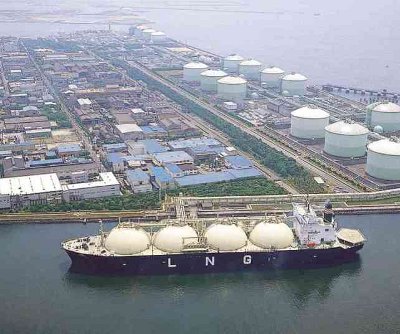The liquefied natural gas sector may be about to change radically, as Japan prepares to introduce the world’s first futures contract on the Tokyo Commodity Exchange. The move is expected to come within the next two years.
It appears that the LNG futures will be for cash settlement in dollars and will be based on an index price for spot LNG cargoes, reports Bloomberg. Although the contracts are not to be for physical delivery, they will allow Exchange Futures for Physical, or EFP, transactions. These let traders swap their respective futures positions for physical holdings.
This is major news for the LNG sector. With such futures, consumers and producers stand to hedge against fluctuations in pricing and can thus present a reasonable counterpoint to the current practice of linking LNG’s costs to those of oil. For Japan, this is particularly important since that country’s LNG bill hit record highs last year.
Bloomberg reports:
“We always seek opportunities to list new futures contracts, although it takes time to develop,” Tadashi Ezaki, the president of Tocom, the nation’s largest commodity exchange, said in an interview in Tokyo yesterday. “We are keen to create a market that meets the needs of domestic and oversees investors.”
 Last year, Japan imported 87.3 million metric tons of LNG at a cost of $64 billion. That’s an average cost of $16.70 per million British thermal units, which is approximately six times the average price of U.S. gas traded on the NY Mercantile Exchange over 2012. That price was $2.83.
Last year, Japan imported 87.3 million metric tons of LNG at a cost of $64 billion. That’s an average cost of $16.70 per million British thermal units, which is approximately six times the average price of U.S. gas traded on the NY Mercantile Exchange over 2012. That price was $2.83.
One reason the trade ministry in Japan prefers a future for cash rather than physical delivery is so traders who lack assets like regasification terminals could also get in on the emerging sector. Moreover, Japan hopes to attract LNG customers from South Korea and Taiwan and will likely ask the U.S. and Singapore to list similar contracts.
There is powerful backing for this move in Japan. The trade ministry had set up a council last November to examine implementation of the contracts; the council includes members from Mitsubishi Corp. (OTC: MSBHY), Mitsui & Co. (OTC: MITSY), Goldman Sachs Group (NYSE: GS), Tokyo Electric (OTC: TKECF), Tokyo Gas Co. (OTC: TKGSY), Inpex Corp. (OTC: IPXHF), and other majors.
It’s certain that once the new futures market launches in 2015, Japan stands to cut costs dramatically, which should ease the post-Fukushima strain considerably.
As of now, Japan accounts for the consumption of more than 30 percent of the world’s LNG demand. Fukushima caused a sharp rise in imports, and the nation’s 2012 bill was more than 25 percent in excess of bills for years past.
Our analysts have traveled the world over, dedicated to finding the best and most profitable investments in the global energy markets. All you have to do to join our Energy and Capital investment community is sign up for the daily newsletter below.
Japanese LNG Pricing
The Wall Street Journal mentions that numerous Japanese users currently maintain that LNG prices, as presently linked to the prices of crude oil, often do not accurately represent the supply and demand fluctuations for LNG. Thus, all parties who agree to Japan’s plan would list LNG futures, denominated in terms of U.S. dollars, on the Tokyo Commodity Exchange.
Investors and buyers across Asia would be able to participate, while nations working on similar LNG hub plans (like Singapore, as mentioned earlier) could also work with Japan.
The broad range of businesses represented in the preliminary sketch provides hope that Japan could pull this off. Electricity and gas utilities, trading houses, futures traders, energy developers and producers, and of course, the Japanese Ministry of Economy, Trade, and Industry, are all represented.
The details remain to be worked out—these include LNG specifications that would satisfy a broad range of customers.
It’s good to see Japan creating an opportunity out of a necessity. After Fukushima caused most of Japan’s nuclear reactors to shut down, LNG usage got a boost—but it came at a cost.
Now, it seems Japan is pushing ahead with trying to transform the LNG market (much as Singapore has already been trying to do). With added momentum and wider interest, the two countries may just shift the Asian LNG markets significantly.
Currently, Japan has just two nuclear reactors operational, with all the rest idling following shutdowns due to widespread public concern. In fact, the Japanese government and utilities companies have kept up consistent campaigning to urge LNG producers to develop new benchmark formulas, moving away from the existing crude benchmark. The Henry Hub has been promoted as one possible alternative.
If you liked this article, you may also enjoy:




